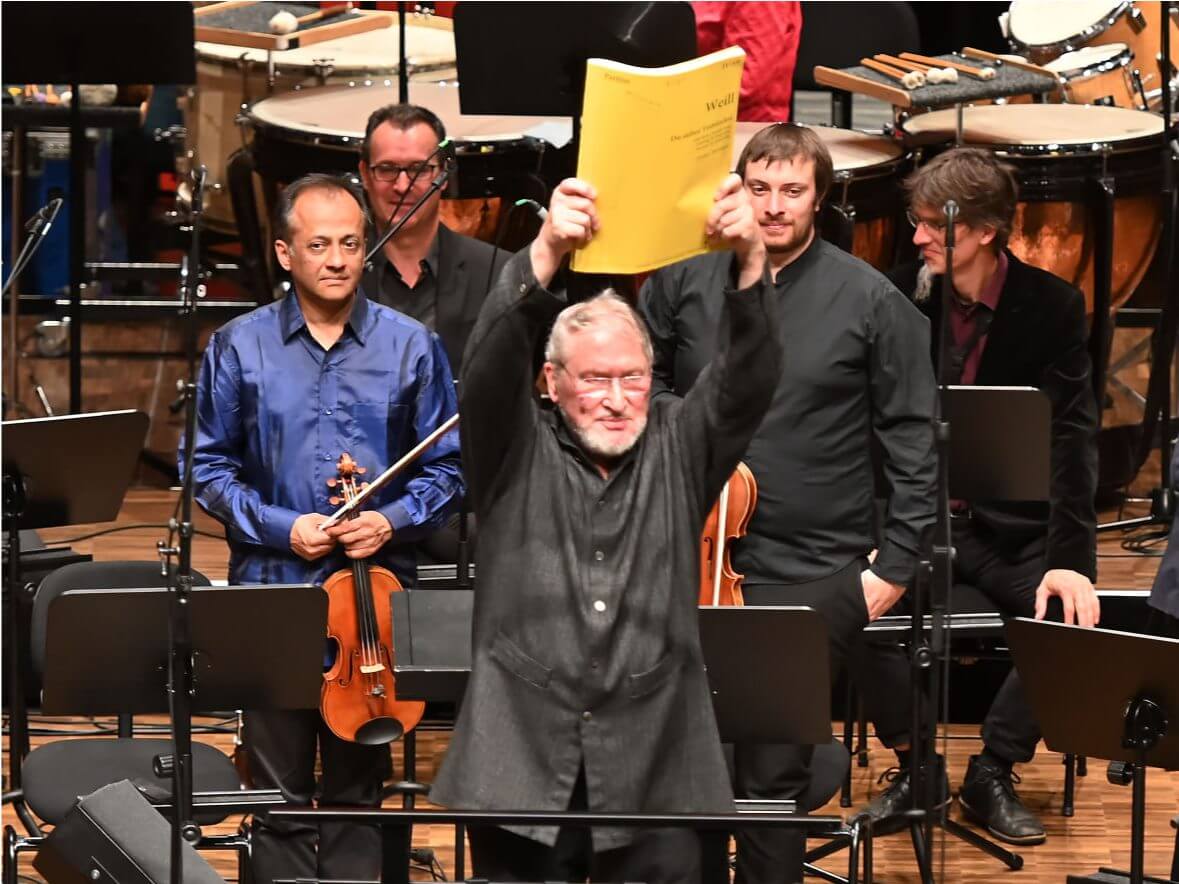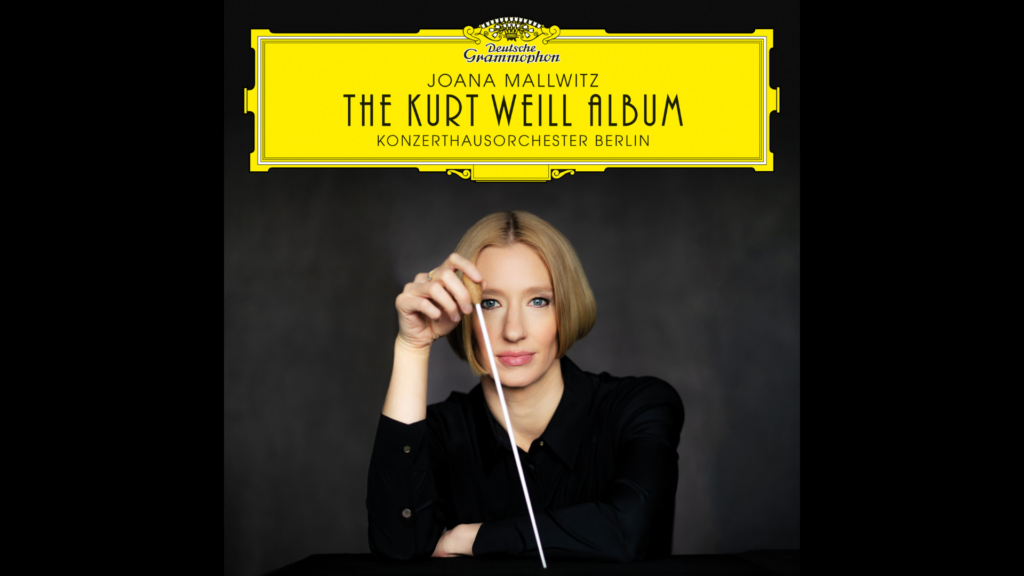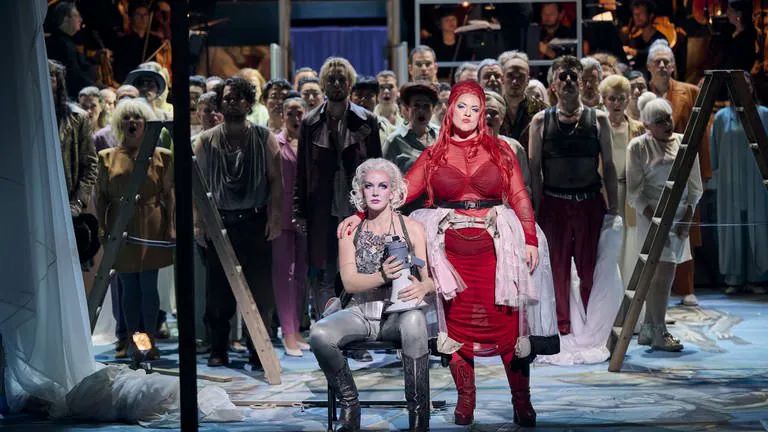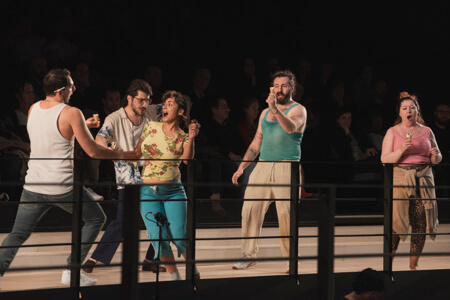
In recognition of his four decades of extraordinary service to the music and artistic legacy of Kurt Weill as chansonnier, conductor, composer, arranger, and advocate, the Board of Trustees of the Kurt Weill Foundation for Music has named HK Gruber the eighth recipient of its Lifetime Distinguished Achievement Award. Foundation President and CEO Kim H. Kowalke conferred the award on 21 September 2019 at a gala reception following the premiere by Ensemble Modern at the Beethovenfest Bonn of a new version of Die sieben Todsünden. Gruber both prepared the new orchestration–in collaboration with Christian Muthspiel–and conducted the premiere, which featured performances by Sarah Maria Sun and the vocal quartet amarcord. At the presentation, Kowalke expressed gratitude to Gruber for “his model performances of a wide repertory of Weill’s works” and for his own oeuvre, “which attests to the longevity and impact of Weill’s esthetic commitment to communication with a wide audience and dedication to socio-political justice.”
Born in 1943 in Vienna, Gruber sang with the Vienna Boys’ Choir as a child and grew up to be a professional double bassist. His composing career began in the 1960s; with Kurt Schwertsik and others, he founded the MOB Art movement. At that early stage, he was already conscious of Weill, “who was able to simplify his music without losing complexity, so that was a very big influence for me,” as he noted in an interview with the Kurt Weill Newsletter in 2015. Gruber learned more about Weill’s compositions and his social and esthetic engagement after he met David Drew in the late 1970s. Drew, at the time not only the dean of Weill scholars but an influential exponent of living composers, admired Gruber’s Frankenstein!! and introduced him to Lotte Lenya in 1979 (she admired the score, too). Gruber continued to draw on Drew’s vast knowledge and understanding of Weill, which resulted in a collaboration on a major project in 1989, the all-Weill recording Berlin im Licht, released on the Largo label in 1990 with Gruber conducting and singing, and Drew as Artistic Director.
That recording became the first of an exemplary series, followed by Der Silbersee (BMG, 1997), on which Gruber sang the role of Olim; an award-winning Die Dreigroschenoper (BMG, 1999), for which he conducted and sang Mr. Peachum; Charming Weill (RCA, 2000), which featured vocalist Max Raabe performing popular arrangements of Weill’s songs under Gruber’s baton; and the latest, world premieres of the critical edition of Mahagonny Songspiel and Chansons des quais along with old favorite Kleine Dreigroschenmusik, performed by Ensemble Modern and released on their label in 2019 (see review in the Kurt Weill Newsletter). Gruber’s appearances as conductor and chansonnier are too numerous to list; highlights include Die Dreigroschenoper at Frankfurt’s Städtische Bühne in 1994, Aufstieg und Fall der Stadt Mahagonny to open the Edinburgh Festival in 2008, Die Dreigroschenoper at the Salzburg Festival in 2015; Die sieben Todsünden with Angelika Kirchschlager and the Swedish Chamber Orchestra (2014); and a host of concerts across Europe and the U.S. with Ensemble Modern, Klangforum Wien, the BBC Orchestra, the London Sinfonietta, and many, many others.
The Lifetime Distinguished Achievement Award was inaugurated in 1990 to honor individuals who have made extensive contributions to the performance and appreciation of Weill’s music over the course of a career. Gruber joins a rarified list of recipients:
Maurice Abravanel, conductor (1990)
David Drew, scholar and advocate (1996)
Teresa Stratas, soprano (1998)
Lys Symonette, Weill and Lenya’s musical assistant (1998)
Julius Rudel, conductor (2000)
Ronald Freed, music publisher (2002)
James Holmes, conductor (2017)


